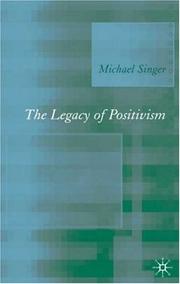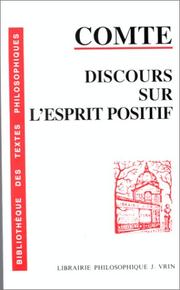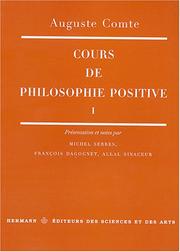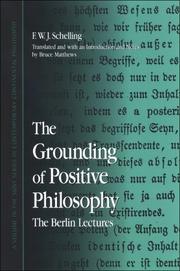| Listing 1 - 10 of 56 | << page >> |
Sort by
|

Abstract | Keywords | Export | Availability | Bookmark
 Loading...
Loading...Choose an application
- Reference Manager
- EndNote
- RefWorks (Direct export to RefWorks)
Positivism --- Humanity, Religion of --- Religion of humanity --- Agnosticism --- Deism --- Philosophy --- Philosophy, Modern --- Rationalism --- Religion --- Religions --- Realism

ISBN: 2711612406 9782711612406 Year: 1999 Publisher: Paris: Vrin,
Abstract | Keywords | Export | Availability | Bookmark
 Loading...
Loading...Choose an application
- Reference Manager
- EndNote
- RefWorks (Direct export to RefWorks)
Avec le positivisme, pense Auguste Comte, s'ouvre une nouvelle ère: celle où l'esprit, délaissant les vaines spéculations théologiques et métaphysiques, s'ancre dans le relatif, à hauteur d'homme et de connaissance humaine, c'est-à-dire dans le positif. Sur ce renversement décisif, s'articulent toute une philosophie des sciences, une morale, une religion même. Conçu à l'usage des "prolétaires", ce texte capital condense, avec rigueur, toutes les thèses de la nouvelle école.
Positivism --- Humanity, Religion of --- Religion of humanity --- Agnosticism --- Deism --- Philosophy --- Philosophy, Modern --- Rationalism --- Religion --- Religions --- Realism
Book
ISBN: 0511701454 110800119X Year: 2009 Publisher: Cambridge Cambridge University Press
Abstract | Keywords | Export | Availability | Bookmark
 Loading...
Loading...Choose an application
- Reference Manager
- EndNote
- RefWorks (Direct export to RefWorks)
The Positive Philosophy of Auguste Comte is a condensed English version of the French philosopher's controversial work, freely translated by Harriet Martineau & published in two volumes in 1853. Martineau's abridged & more easily digestible version of Comte's work was intended to be readily accessible to a wide general readership, particularly those she felt to be morally & intellectually adrift, & Comte's philosophy indeed attracted a significant following in Britain in the later 19th century. Comte's 'doctrine' promoted personal & public ethics & social cohesion based no longer on metaphysics but on strict scientific method, & anticipated 20th century logical positivism & secular humanism. The first volume of this translation contains Parts 1 to 5 & sets out the nature & importance of positivism, leading on to an overview of the 'positive sciences': mathematics, astronomy, physics, chemistry & biology.
Positivism. --- Humanity, Religion of --- Religion of humanity --- Agnosticism --- Deism --- Philosophy --- Philosophy, Modern --- Rationalism --- Religion --- Religions --- Realism

ISBN: 2705663517 9782705663513 Year: 1998 Publisher: Paris: Hermann,
Abstract | Keywords | Export | Availability | Bookmark
 Loading...
Loading...Choose an application
- Reference Manager
- EndNote
- RefWorks (Direct export to RefWorks)
Positivism. --- Positivism --- Humanity, Religion of --- Religion of humanity --- Agnosticism --- Deism --- Philosophy --- Philosophy, Modern --- Rationalism --- Religion --- Religions --- Realism
Book
ISBN: 0140212248 Year: 1972 Publisher: Harmondsworth Penguin Books
Abstract | Keywords | Export | Availability | Bookmark
 Loading...
Loading...Choose an application
- Reference Manager
- EndNote
- RefWorks (Direct export to RefWorks)
Positivism --- Humanity, Religion of --- Religion of humanity --- Agnosticism --- Deism --- Philosophy --- Philosophy, Modern --- Rationalism --- Religion --- Religions --- Realism --- Positivism.

ISBN: 9780791471296 Year: 2007 Publisher: Albany, N.Y. State University of New York Press
Abstract | Keywords | Export | Availability | Bookmark
 Loading...
Loading...Choose an application
- Reference Manager
- EndNote
- RefWorks (Direct export to RefWorks)
Philosophy, Modern --- Positivism --- Humanity, Religion of --- Religion of humanity --- Agnosticism --- Deism --- Philosophy --- Rationalism --- Religion --- Religions --- Realism --- History --- Metaphysics

ISBN: 0791479943 1435600096 9781435600096 0791471292 9780791471296 9780791479940 Year: 2007 Publisher: Albany State University of New York Press
Abstract | Keywords | Export | Availability | Bookmark
 Loading...
Loading...Choose an application
- Reference Manager
- EndNote
- RefWorks (Direct export to RefWorks)
The Berlin lectures in The Grounding of Positive Philosophy, appearing here for the first time in English, advance Schelling's final "existential system" as an alternative to modernity's reduction of philosophy to a purely formal science of reason. The onetime protégé of Fichte and benefactor of Hegel, Schelling accuses German Idealism of dealing "with the world of lived experience just as a surgeon who promises to cure your ailing leg by amputating it." Schelling's appeal in Berlin for a positive, existential philosophy found an interested audience in Kierkegaard, Engels, Feuerbach, Marx, and Bakunin. His account of the ecstatic nature of existence and reason proved to be decisive for the work of Paul Tillich and Martin Heidegger. Also, Schelling's critique of reason's quixotic attempt at self-grounding anticipates similar criticisms leveled by poststructuralism, but without sacrificing philosophy's power to provide a positive account of truth and meaning. The Berlin lectures provide fascinating insight into the thought processes of one of the most provocative yet least understood thinkers of nineteenth-century German philosophy.
Positivism. --- Philosophy, Modern --- Humanity, Religion of --- Religion of humanity --- Agnosticism --- Deism --- Philosophy --- Rationalism --- Religion --- Religions --- Realism --- History.
Book
ISBN: 3030834387 3030834379 Year: 2021 Publisher: Cham, Switzerland : Palgrave Macmillan,
Abstract | Keywords | Export | Availability | Bookmark
 Loading...
Loading...Choose an application
- Reference Manager
- EndNote
- RefWorks (Direct export to RefWorks)
Philosophers --- Positivism. --- Congreve, Richard, --- Humanity, Religion of --- Religion of humanity --- Agnosticism --- Deism --- Philosophy --- Philosophy, Modern --- Rationalism --- Religion --- Religions --- Realism
Book
ISBN: 9462741034 9789462364448 9462364443 9789462741034 Year: 2014 Publisher: The Hague
Abstract | Keywords | Export | Availability | Bookmark
 Loading...
Loading...Choose an application
- Reference Manager
- EndNote
- RefWorks (Direct export to RefWorks)
Safety and security are often seen in light of crime, disorder, and fear. This fuels a political and social climate obsessed with a negative logic of 'fighting' criminals, 'controlling' populations, and 'excluding' unwanted others. Other, more positive or constitutive, discourses and practices about safety and security have fallen out of fashion. But, what alternatives to contemporary processes of securitization and criminalization can be imagined when starting from a positive critique of security? Which theoretical and empirical resources support and inspire more positive notions of security?
Criminology. --- Positivism. --- Humanity, Religion of --- Religion of humanity --- Agnosticism --- Deism --- Philosophy --- Philosophy, Modern --- Rationalism --- Religion --- Religions --- Realism --- Crime --- Social sciences --- Criminals --- Study and teaching
Book
ISBN: 2130375723 9782130375722 Year: 1982 Volume: 2034 Publisher: Paris : Presses universitaires de France,
Abstract | Keywords | Export | Availability | Bookmark
 Loading...
Loading...Choose an application
- Reference Manager
- EndNote
- RefWorks (Direct export to RefWorks)
History of philosophy --- Theory of knowledge --- Positivism --- Positivisme --- Humanity, Religion of --- Religion of humanity --- Agnosticism --- Deism --- Philosophy --- Philosophy, Modern --- Rationalism --- Religion --- Religions --- Realism --- Positivism.
| Listing 1 - 10 of 56 | << page >> |
Sort by
|

 Search
Search Feedback
Feedback About UniCat
About UniCat  Help
Help News
News